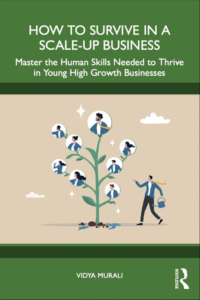How to Survive in a Scale-up Business
 Master the human skills needed to thrive in Young High Growth Businesses
Master the human skills needed to thrive in Young High Growth Businesses
According to the Scale Up Institute, over 34,000 scale-ups were recorded in the UK in 2024, generating £1.4trn in turnover despite only making up less than 0.6% of the SME population. Offering fast growth, agility, and ownership, scale-ups are an attractive employment prospect, yet many who enter the industry burn out, quit, or fail to stay the course in the midst of inconsistency, uncertainty and volatility. For scale-up industry leader, coach and author, Vidya Murali, it doesn’t have to be this way. With the right knowledge and practical toolkit, it is possible to succeed in this unique landscape and create cultures where employees can thrive.
Within her new book How to Survive in a Scale-Up Business, Murali expertly demystifies the scale-up experience. Using over 20 years of deep industry knowledge working with leading tech businesses, including Amazon and high-growth scale-ups such as Deliveroo, she offers a comprehensive toolkit for navigating the complexities of these environments.
Divided into five accessible parts, in the first two sections Murali opens by sharing why she wrote the book before helping readers to understand the scale-up space, including a personal scale-up suitability checklist designed to help assess whether this is the right environment for them based on their skills and preferences. The third section is packed with concrete strategies for landing the right job, navigating the first 90 days, and managing toxic patterns, helping readers avoid common pitfalls that derail even the most experienced professionals.
Part four is told through real-life stories that offer tangible lessons. Unlike many other scale-up books, How to Survive in a Scale-up Business is a rare opportunity to be mentored by the interviewees, who are all highly respected industry leaders. Furthermore, drawing on her own extensive experience, Murali reframes the obstacles and challenges she has faced as a leader into valuable lessons, encouraging the reader’s own reflection with insights, frameworks, and coaching questions. Cultivating this emotional intelligence is essential for scale-up success.
The final section of the book focuses on one of the most important aspects of navigating the scale-up industry: yourself. As a woman of colour, an introvert, and someone who experienced significant anxiety in the wake of the pandemic, Murali emphasises the importance of prioritising mental and emotional health – particularly in high-growth and fast-paced business environments. The book keenly spotlights practical strategies to help introverts, minorities, highly sensitive people, and those with ADHD and/or dyslexia thrive, and what employers can do to cultivate inclusion. Murali also provides tools for navigating job loss or mental health challenges – two increasingly common challenges in today’s working climate – and rebuilding your emotional capacity.
Whether a graduate seeking their first full-time role, a professional transitioning from a corporate environment, a new start-up founder, or an HR professional creating the optimal environment for teams to do their best work, How to Survive in a Scale-up Business is a must-read. With Murali’s guidance, individuals can embrace challenges with curiosity and flourish in this complex, fast-evolving landscape.


